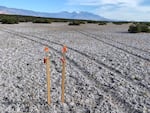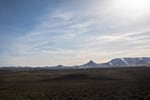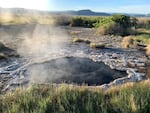
Stakes mark a mining claim in the Alvord Desert near Fields, Ore. Reedy Lagoon Corporation of Australia was targeting lithium brines associated with geothermal hot springs before their claims were invalidated.
Courtesy of Katie Fite / Wildlands Defense
An Australian company is calling it quits on a lithium project in southeast Oregon’s Alvord Desert.
The Reedy Lagoon Corporation, a mineral explorer based outside Melbourne, announced Friday that it would stop work on its project near the town of Fields, Oregon, after finding out the land was off limits to new mining.
It’s the second lithium project to flop in Harney County this summer as companies look to cash in on the United States’ hunger for the mineral known as “white gold.” Lithium is the main ingredient in batteries for electric vehicles, consumer electronics and energy storage.
Reedy Lagoon quietly staked claims this summer on nearly 9,000 acres surrounding Borax Lake and on the southern portion of the Alvord Playa, a dried-up alkali lakebed, and made its initial pitch to investors.
Harney County has more than 20 active mines, according to data from the state Department of Geology and Mineral Industries, most of them small basalt and cinder mines. Lithium mining would likely be a much bigger undertaking.
Local landowners took quick note of the wooden stakes dotting the iconic desert landscape and notified the Bureau of Land Management field office in Burns.
“Lithium is such a buzzword in Oregon … that people are extra vigilant to it,” said Katie Rhode, a geologist with the Burns BLM.
Related: A new Oregon mining boom could be a bust for sage grouse
Safeguarding the Alvord Desert from new mining has been a priority for decades.
Congress passed a law in 2000 protecting hundreds of thousands of acres in the Steens Mountain area, including the Alvord. The desert and lakebed playa are increasingly popular with recreationists seeking solitude in an otherworldly Oregon landscape.
The law included what’s known as a mineral withdrawal, which prohibits new mineral and geothermal development in the area.
After Rhode confirmed Reedy Lagoon’s stakes were subject to that withdrawal, the BLM informed the company its claims would be invalidated and the stakes should be removed.
Reedy Lagoon managing director Geof Fethers said in a press release that the company was scrapping the project on the BLM’s advice.
Staked by association
Federal laws governing mining and prospecting in the U.S. encourage people and companies to look for mineral resources on public lands and don’t always require them to notify land managers. Rhode said the BLM isn’t always immediately aware when stakes go in the ground.
“In this case, I really feel like it helps that there were extra eyes on the ground that would help us see the work that’s happening on this really large landscape,” she said.
Reedy Lagoon had 90 days from the time its claims were staked to alert land managers but would have run into the Steens mineral withdrawal regardless.
The prohibition on new mining also nixed Canadian company ACME Lithium’s project near Whitehorse Ranch earlier this year. Both ACME Lithium and Reedy Lagoon touted the projects’ proximity to the more well-developed projects to the southeast in statements to investors.

Disaster Peak punctuates the northwest rim of the McDermitt Caldera on the Oregon-Nevada border in this March 2022 file photo. The caldera has some of the highest concentrations of lithium in the U.S., but mineral companies have also eyed smaller calderas nearby.
Bradley W. Parks / OPB
The McDermitt Caldera, a 16 million-year-old supervolcano straddling the Oregon-Nevada border, has some of the highest concentrations of lithium in the United States.
On the Nevada side of the caldera, Canadian company Lithium Americas has all the required permits to begin construction on a large, open-pit lithium mine at Thacker Pass that has faced staunch opposition from environmental groups, several Native American tribes and some local ranchers. The federal decision to approve the mine is under appeal.
Meanwhile, Australian company Jindalee Resources has continued its lithium exploration on the Oregon side of the caldera, despite similar opposition. The company is several years away from proposing a mine if it ever does.
The ban on new mining in the Steens Mountain region stopped Reedy Lagoon and ACME Lithium in their tracks, but the nascent projects may not have made it very far anyway.
Oregon is not Nevada
Few companies have pursued lithium in Oregon compared to its southern neighbor Nevada.
The Silver State has the country’s only operative lithium mine, and dozens of companies have staked claims and started exploring for the mineral there in a Wild West fashion. Only Jindalee is actively exploring for lithium in Oregon.
That’s partly because the ingredients for large — and economically viable — lithium deposits are less common in the Beaver State.
According to the Minerals Education Coalition, lithium deposits form in pegmatites, a type of rock, and in lake brines or playas such as the Alvord Desert.

Steam rises from Borax Hot Springs in the Alvord Desert near Fields, Ore. Reedy Lagoon Corporation staked mining claims to target lithium brines associated with the geothermal hot springs.
Courtesy of Katie Fite / Wildlands Defense
Most of the lakebed and brine deposits in the United States occur in what’s known as the Basin and Range Province, a large geographic region that covers most of the inland West and portions of Mexico. It’s characterized by rugged mountain ranges and enclosed lakes or basins with no or few outlets to the ocean.
“The Basin and Range province only occurs in the southeasternmost portion of Oregon, whereas it covers nearly the whole state of Nevada,” said Thomas Benson, a volcanologist who now works as the vice president of global exploration for Lithium Americas, in an email.
Benson’s doctoral research focused on calderas in Oregon and Nevada created by the Yellowstone hotspot, a stationary plume of hot mantle that’s created volcanoes from McDermitt to Yellowstone National Park.
Benson said the McDermitt Caldera is a unique geologic feature in which all the ingredients for large lithium deposits are combined.
After the initial eruption at McDermitt more than 16 million years ago, Benson said, additional magmatic episodes left different concentrations of lithium in the lakebed clays on either side of the state line.
“The southern portion of the caldera on the Nevada side at Thacker Pass … is significantly higher in grade than the sediments on the Oregon side of the border,” he said.
Related: How Oregon landed a lithium bounty
Still, Rhode with the Burns BLM said she wasn’t surprised to find more companies looking for lithium in the Alvord Desert. Reedy Lagoon and ACME Lithium both staked claims in smaller calderas adjacent to McDermitt.
“It would make geologic sense that there would be a similar deposit [in those calderas],” Rhode said.
If demand for lithium continues to soar and known resources are exhausted by mining, smaller or less-concentrated deposits like Oregon’s could become more appealing to the mineral industry.
But as long as the Steens Mountain protections remain on the books, the Alvord Desert will be off limits.
